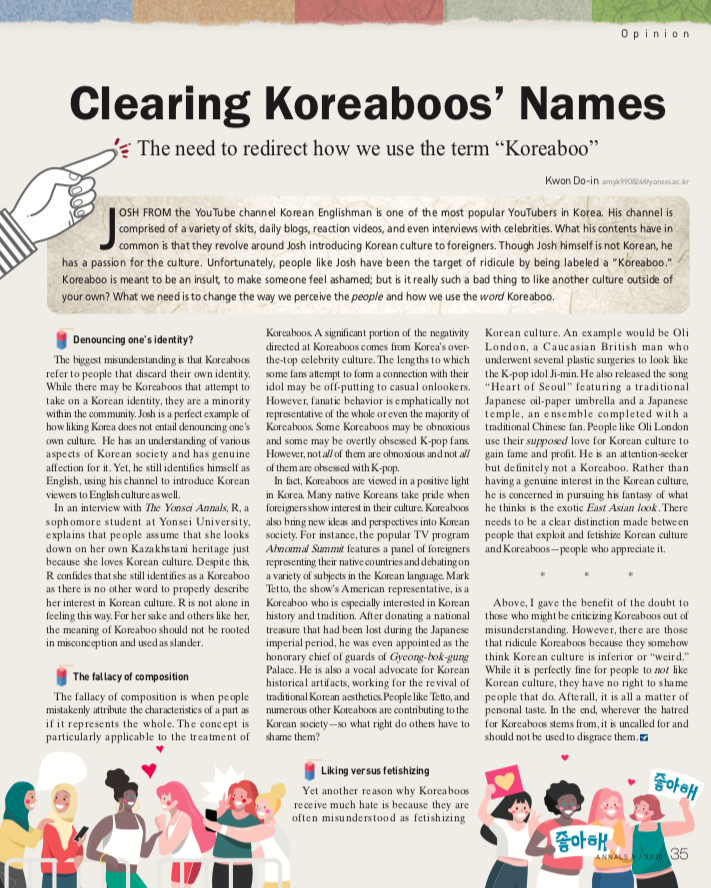The need to redirect how we use the term “Koreaboo”

JOSH FROM the YouTube channel Korean Englishman is one of the most popular YouTubers in Korea. His channel is comprised of a variety of skits, daily blogs, reaction videos, and even interviews with celebrities. What his contents have in common is that they revolve around Josh introducing Korean culture to foreigners. Though Josh himself is not Korean, he has a passion for the culture. Unfortunately, people like Josh have been the target of ridicule by being labeled a “Koreaboo.” Koreaboo is meant to be an insult, to make someone feel ashamed; but is it really such a bad thing to like another culture outside of your own? What we need is to change the way we perceive the people and how we use the word Koreaboo.
Denouncing one’s identity?
The biggest misunderstanding is that Koreaboos refer to people that discard their own identity. While there may be Koreaboos that attempt to take on a Korean identity, they are a minority within the community. Josh is a perfect example of how liking Korea does not entail denouncing one’s own culture. He has an understanding of various aspects of Korean society and has genuine affection for it. Yet, he still identifies himself as English, using his channel to introduce Korean viewers to English culture as well.
In an interview with The Yonsei Annals, R, a sophomore student at Yonsei University, explains that people assume that she looks down on her own Kazakhstani heritage just because she loves Korean culture. Despite this, R confides that she still identifies as a Koreaboo as there is no other word to properly describe her interest in Korean culture. R is not alone in feeling this way. For her sake and others like her, the meaning of Koreaboo should not be rooted in misconception and used as slander.
The fallacy of composition
The fallacy of composition is when people mistakenly attribute the characteristics of a part as if it represents the whole. The concept is particularly applicable to the treatment of Koreaboos. A significant portion of the negativity directed at Koreaboos comes from Korea’s over-the-top celebrity culture. The lengths to which some fans attempt to form a connection with their idol may be off-putting to casual onlookers. However, fanatic behavior is emphatically not representative of the whole or even the majority of Koreaboos. Some Koreaboos may be obnoxious and some may be overtly obsessed K-pop fans. However, not all of them are obnoxious and not all of them are obsessed with K-pop.
In fact, Koreaboos are viewed in a positive light in Korea. Many native Koreans take pride when foreigners show interest in their culture. Koreaboos also bring new ideas and perspectives into Korean society. For instance, the popular TV program Abnormal Summit features a panel of foreigners representing their native countries and debating on a variety of subjects in the Korean language. Mark Tetto, the show’s American representative, is a Koreaboo who is especially interested in Korean history and tradition. After donating a national treasure that had been lost during the Japanese imperial period, he was even appointed as the honorary chief of guards of Gyeong-bok-gung Palace. He is also a vocal advocate for Korean historical artifacts, working for the revival of traditional Korean aesthetics. People like Tetto, and numerous other Koreaboos are contributing to the Korean society—so what right do others have to shame them?
Liking versus fetishizing
Yet another reason why Koreaboos receive much hate is because they are often misunderstood as fetishizing Korean culture. An example would be Oli London, a Caucasian British man who underwent several plastic surgeries to look like the Korean idol Ji-min. He also released the song “Heart of Seoul” featuring a traditional Japanese oil-paper umbrella and a Japanese temple, an ensemble completed with a traditional Chinese fan. People like Oli London use their supposed love for Korean culture to gain popularity and profit. He is an attention-seeker but definitely not a Koreaboo. Rather than having a genuine interest in the Korean culture, he is concerned in pursuing his fantasy of what he thinks is the exotic East Asian look. There needs to be a clear distinction made between people that exploit and fetishize Korean culture and Koreaboos—people who appreciate it.
* * *
Above, I gave the benefit of the doubt to those who might be criticizing Koreaboos out of misunderstanding. However, there are those that ridicule Koreaboos because they somehow think Korean culture is inferior or “weird.” While it is perfectly fine for people to not like Korean culture, they have no right to shame people that do. Afterall, it is all a matter of personal taste. In the end, wherever the hatred for Koreaboos stems from, it is uncalled for and should not be used to disgrace them.
Kwon Do-in
amyk990824@yonsei.ac.kr

